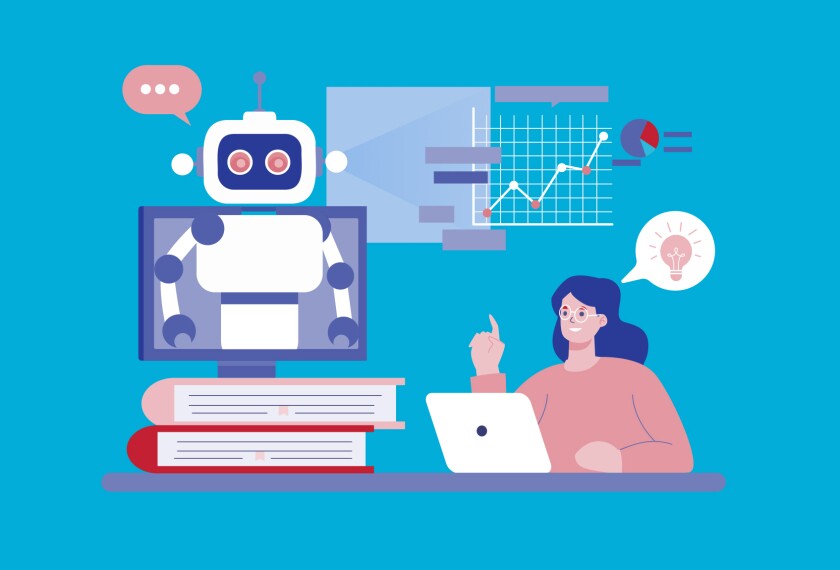Artificial intelligence has captivated the K-12 system’s attention since the arrival of ChatGPT, a free and easy-to-use AI tool that can answer almost any prompt.
Educators across the country are discussing what and how much of a role AI should play in instruction, especially as AI experts say today’s students need to learn how to use the technology effectively to be successful in future jobs.
But many educators say they are not prepared to teach students how to be successful in an AI-powered world. In an Education Week K-12 Essentials Forum panel discussion, middle school English teacher Chad Towarnicki and Stanford Graduate School of Education senior adviser Glenn Kleiman discussed how the field can prepare students and teachers for an AI-powered world.
AI is ‘a moving target’
The problem with ensuring that teachers are prepared to teach with and about AI is that “it’s constantly a moving target. It’s constantly evolving,” said Towarnicki, an 8th grade English teacher in the 4,800-student Wissahickon school district in Pennsylvania. All kinds of AI tools have popped up and it’s challenging for educators to keep track of all of them, he added.
AI is “not something that can be professionally developed in one or two in-service days,” Towarnicki said. But the problem is that “once the school year starts, [teachers] are already fighting to keep their head above water.”
Kleiman, whose research focuses on the potential of AI to enhance teaching and learning, said that while this is a challenging situation for educators, “we all have to take a number of deep breaths.”
Education is “very complex” and “cannot move at the pace the tech industry moves,” so education leaders need to take this step by step, Kleiman said.
To begin with, everyone needs to understand the potential downsides to this technology, Kleiman said. AI tools can produce fabricated and biased responses based on faulty data it might be using. The technologies have the potential to expose private and sensitive data about students. And educators are also concerned about students using these tools to cheat on assignments.
The most important step that education leaders can take is to give educators the time and support to explore the benefits and drawbacks of using AI tools for instruction and the management of schools, Kleiman said. “It’s really a time of experimentation.”
What role district leaders can play
District leaders and principals should support teachers in using AI to “make their work life a little easier and save them time,” Kleiman said.
School system leaders also set the tone for their districts. That is why they need to think about policies that will help educators navigate this new AI landscape, Kleiman said. For instance, districts need to have conversations with educators, students, and parents around what counts as cheating when it comes to using AI.
Strong leadership is key to ensuring educators are prepared to teach with and about AI, the panelists said.
“It really takes leadership that’s aware of what’s going on in the classrooms and plugged into what their teachers are doing,” Towarnicki said.
Think of AI as a ‘teacher’s assistant’
Towarnicki and his English department colleagues have tried using AI tools for differentiation—taking a story and modifying the vocabulary to match students’ different reading levels. They’ve also used it to generate writing prompts, discussion questions, lesson plans, and other curricular materials—all things that can save the teachers time.
“It really is a Pandora’s box,” Towarnicki said. “It’s amazing what it’s capable of, but it takes time to learn and familiarize yourself.”
Kleiman said it might be helpful for teachers to think of AI as a tool that “augments and enhances what [they] do.” It’s a “teacher’s assistant that needs to be guided by the teacher, with the teacher remaining responsible,” he said.








